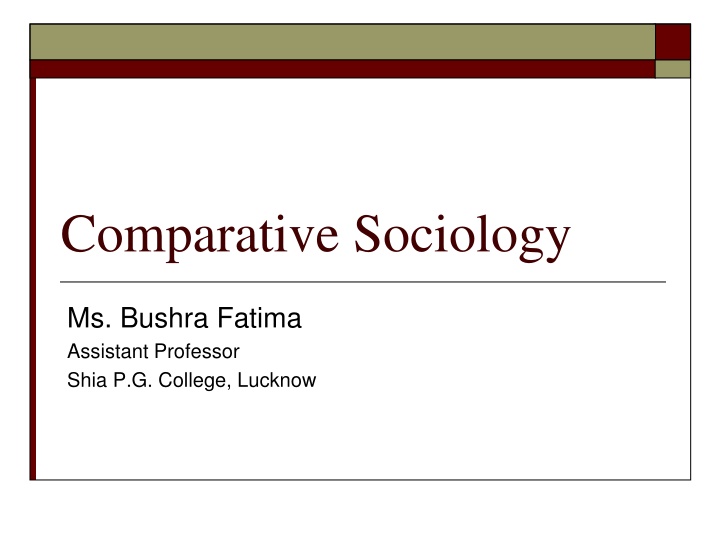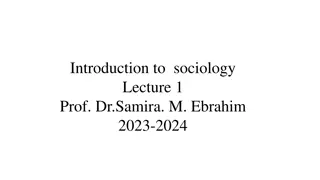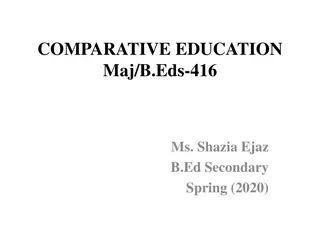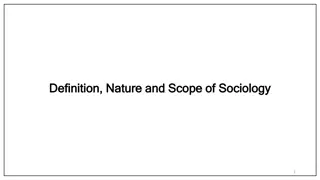Comparative Sociology
Comparative Sociology is a specialized branch that compares societies to provide generalizations, focusing on the structure and jurisdiction of groups and organizations. It involves studying affinities and disparities to predict outcomes. The discipline is closely related to Social Anthropology. Comparative Sociology studies macro societies with quantitative techniques, while Social Anthropology studies micro societies using qualitative methods. The nature of Comparative Sociology is scientific, emphasizing the importance of real affinities and disparities in societal studies.
Download Presentation

Please find below an Image/Link to download the presentation.
The content on the website is provided AS IS for your information and personal use only. It may not be sold, licensed, or shared on other websites without obtaining consent from the author.If you encounter any issues during the download, it is possible that the publisher has removed the file from their server.
You are allowed to download the files provided on this website for personal or commercial use, subject to the condition that they are used lawfully. All files are the property of their respective owners.
The content on the website is provided AS IS for your information and personal use only. It may not be sold, licensed, or shared on other websites without obtaining consent from the author.
E N D
Presentation Transcript
Comparative Sociology Ms. Bushra Fatima Assistant Professor Shia P.G. College, Lucknow
Comparative Sociology Comparative Sociology is a specialized branch of general Sociology. It compares two or more than two societies at one point of time and provide generalization. It's main content lies in the study of the Organism (constitution) of groups and organizations, their jurisdiction, their problems, concept of vision and in mutual comparison of these to ascertain the affinities and disparities underlying them.
Continuum It brings out the generalization and prediction after comparing two or many societies Generalizations are given by using comparative method. The comparative study of primitive and modern society is placed at a prime location in this specialized branch of Sociology. Stanislav Andreski has analyzed the content, scope and study method of comparative Sociology in his book The uses of Comparative Sociology.
Continuum Andreski has emphasized that it is the prime requirement of comparison that there should be some affinity among the objects compared. Andreski has also emphasized that the parties on the base of which we study different aspects, should be real not imaginary. On these real bases the comparative study become scientific and real.
Comparison between Comparative Sociology and Social Anthropology In Social Anthropology comparative method is used . According to Radcliffe Brown," Social Anthropology is nothing but Comparative Sociology." There is very little difference between Comparative Sociology and Social Anthropology, at research level both the discipline follow similar kind of principals and study similar type of topics.
The difference between them are as follows- Comparative Sociology Studies macro societies like cities, large rural areas, industrial area or complex societies. Follows Survey method and Sampling technique . Follows Statistical method or quantitative technique. Studies society. Social Anthropology Studies micro societies like few villages, tribal, primitive or simple society. Follows Fieldwork method and Participant observation technique. Follows qualitative technique. Studies culture.
Nature of Comparative Sociology Comparative Sociology is purely scientific and it is closely related to positivism. In this method only realistic affinities and disparities of societies and groups should be mentioned as the issues of the study and in frames should be drawn very carefully and without any partiality. Inclusion of imagination and conjecture can bring severe harms to Comparative Sociology.
Continuum This method should come forward making a fine association with Positivism and thus should incorporate new perception and insight in Comparative Sociology. Comparative Sociology aims at bringing on board the uniformities hidden under the outer surface of disparities.
Continuum Gopal Saran in his book The Methodology of Anthropological Comparison has highlighted three facts of comparative method leading to its scientific attitude and realistic approach- Unit of comparison Objectives of comparison System of comparison
Scope of Comparative Sociology Under the scope of Comparative Sociology we can study on the one hand various primitive societies, on the other modern societies and at another instance the comparative study of these two societies can also be made. It comparatively studies the societies. It comparatively studies the religion and culture of societies.
Continuum It comparatively studies the institution and organisations (Social, Economic & Political) Ecology Groups and collectivities Interactions Cross- Societal studies
Importance of Comparative Sociology Andreski has written that the comparative study of groups and society can add to international co- operation and integration. The knowledge attained by the study of Comparative Sociology can also play a significant role in decreasing unjust and unnecessary emotional attachment towards ones own society and culture, bias ethics and sense of disdain to other societies and groups.
Continuum The hidden fundamental uniformities behind the external varieties of the world that can be easily brought on surface by Comparative Sociology. UNESCO has also emphasized the development of Comparative Sociology for international integration and co-operation in the book International Culture and Comparative Sociology published by UNESCO.
Reference Oplinger, J. , An Introduction to Comparative Sociology Andreski, S., The Uses of Comparative Sociology























